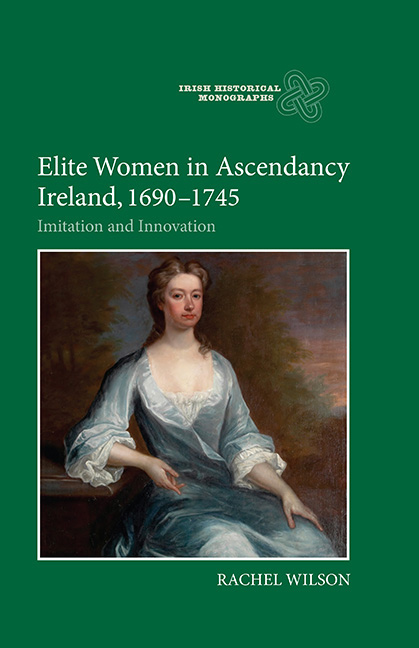Book contents
- Frontmatter
- Dedication
- Contents
- Acknowledgements
- Abbreviations
- A Note on the Presentation of Material in the Text
- Introduction
- 1 The Making and Breaking of a Marriage
- 2 Mothers and Children
- 3 The lady of the house
- 4 Widows, Guardians and Estate Managers
- 5 Society Queens
- 6 Political Players
- 7 Institutional philanthropy
- Conclusion
- Appendices: Family Trees
- Bibliography
- Index
- Frontmatter
- Dedication
- Contents
- Acknowledgements
- Abbreviations
- A Note on the Presentation of Material in the Text
- Introduction
- 1 The Making and Breaking of a Marriage
- 2 Mothers and Children
- 3 The lady of the house
- 4 Widows, Guardians and Estate Managers
- 5 Society Queens
- 6 Political Players
- 7 Institutional philanthropy
- Conclusion
- Appendices: Family Trees
- Bibliography
- Index
Summary
Historians of all but the most recent past will always suffer from one insurmountable limitation; the inability to talk to their subjects. Unfortunately we cannot resurrect women like Katherine Conolly, or her sisters, Mary Jones and Jane Bonnell, all of whom were alive in both 1690 and 1745, and ask them to compare what their lives and the lives of their contemporaries had been and had become during this period. However, they, and other women like them, speak to us from beyond the grave in other ways, through the vast collection of letters and papers they have left behind which tell their stories for them. These stories speak of change and continuity, of a Catholic elite which had been forcibly and almost completely replaced by a Protestant Ascendancy and of the challenges which elite women in Ireland faced in this new world, as they negotiated their way through a period marked by great political, social, cultural and religious upheaval and transition. As time went by, they incorporated into their lives elements drawn from across the British elite which would allow them to assimilate more easily with their neighbours and bolster they and their families’ positions within Ireland. They adopted a bi-cultural education which would prepare them to move in both the English and Irish elites, the Protestant among them (who formed the bulk of their ranks) decorated their homes in a manner designed to demonstrate their so-called ‘right to rule’ and they embraced entertainments and philanthropic institutions which had first appeared in England.
Yet the more things changed, the more they stayed the same, and though the lives of these women may have been informed by and in some cases, mirrored that of their English and Scottish counterparts, they were not dictated by the British example. The peculiarly Irish tradition of socially and geographically endogamous marriages remained, as did the high degree of political involvement its ladies were afforded, which extended, through conversation and correspondence, right into the House of Commons itself and was accompanied by a level of acceptance from the male elite which was unmatched elsewhere in the British Isles. The result was a group of women who were a mix of the insular and the cosmopolitan.
- Type
- Chapter
- Information
- Elite Women in Ascendancy Ireland, 1690-1745Imitation and Innovation, pp. 164 - 166Publisher: Boydell & BrewerPrint publication year: 2015

